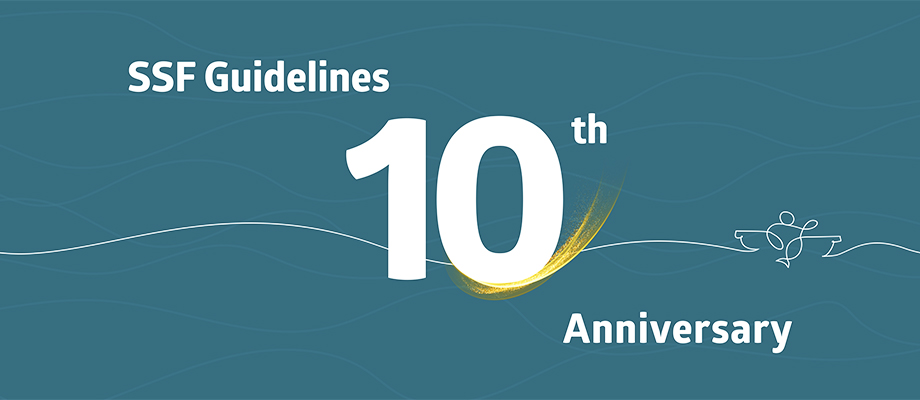The 10th anniversary of the SSF Guidelines

In 2024 we celebrate the 10th anniversary of the endorsement of the Voluntary Guidelines for Securing Sustainable Small-Scale Fisheries in the Context of Food Security and Poverty Eradication (SSF Guidelines). To bring together responsible fisheries and sustainable development, the SSF Guidelines address key thematic issues such as governance of tenure in small-scale fisheries and resource management; social development, employment and decent work; value chains, post-harvest and trade; gender equality and disaster risks and climate change.
They also focus on ensuring an enabling environment and supporting implementation through policy coherence, institutional coordination and collaboration; information, research and communication; capacity development and implementation support and monitoring.
The SSF Guidelines are addressed to FAO Members and non-Members, at all levels of the country, as well as to subregional, regional, international and intergovernmental organizations and small-scale fisheries actors. They are also aimed at research and academic institutions, the private sector, non-governmental organizations and all others concerned with the fisheries sector, coastal and rural development and the use of the aquatic environment. Over the years, thanks to the intense dedication of numerous partners, they not only have become the most important international instrument entirely dedicated to small-scale fisheries but have begun to be implemented in many countries. Since 2021, four countries have developed and launched National Plans of Action for Small-Scale Fisheries (NPOAs-SSF) and many others have started consultations processes.
The SSF Guidelines are global in scope, and they guide dialogue, policy processes and actions at the local, national, regional and international levels. Implementing the SSF Guidelines calls for a balanced and equitable participatory approach, as well as cross-sectoral collaboration between all relevant stakeholders, which helps realize a new vision for small-scale fisheries.
The SSF Guidelines build and strengthen partnerships. A vital aspect of that includes partnering with organizations to enhance ownership locally and globally. Policy processes, which are an important basis for national SSF Guidelines implementation and impact at local level, are actively supported by FAO. Targeting at a regional level creates impact, taking into consideration available resources and FAO’s comparative advantages.
Under the Umbrella of FAO’s Blue Transformation, FAO will continue to support countries and other partners to implement the SSF Guidelines, with a focus on local and national level action. This will include in particular the following:
- the improvement of legal and regulatory frameworks and related capacities for inclusive and secure small-scale fisheries governance and development;
- the strengthening of small-scale fisheries organizations, including women, youth and Indigenous Peoples; and
- improved multi-dimensional, inter-disciplinary data and information generation and analysis to inform small-scale fisheries policy, governance and management.
Their implementation supports the achievement of the Sustainable Development Goals (SDGs) and are aligned with FAO’s strategic framework of achieving a better production, better nutrition, a better environment, and a better life for all as they SSF Guidelines address policies, strategies and legal frameworks concerning small-scale fisheries, but also other matters affecting lives and livelihood in fishing communities, leaving no on behind.
2024 is a year of celebration, but it is also a year to reflect on what has been done so far and what is still to be done to achieve greater success for the small-scale fisheries subsector. The food, economic and climate crisis are only a few of the challenges we will be facing in the upcoming years. We need to ensure that small-scale fisheries are strong, capacitated, resilient and prepared to face all the challenges yet to come.
